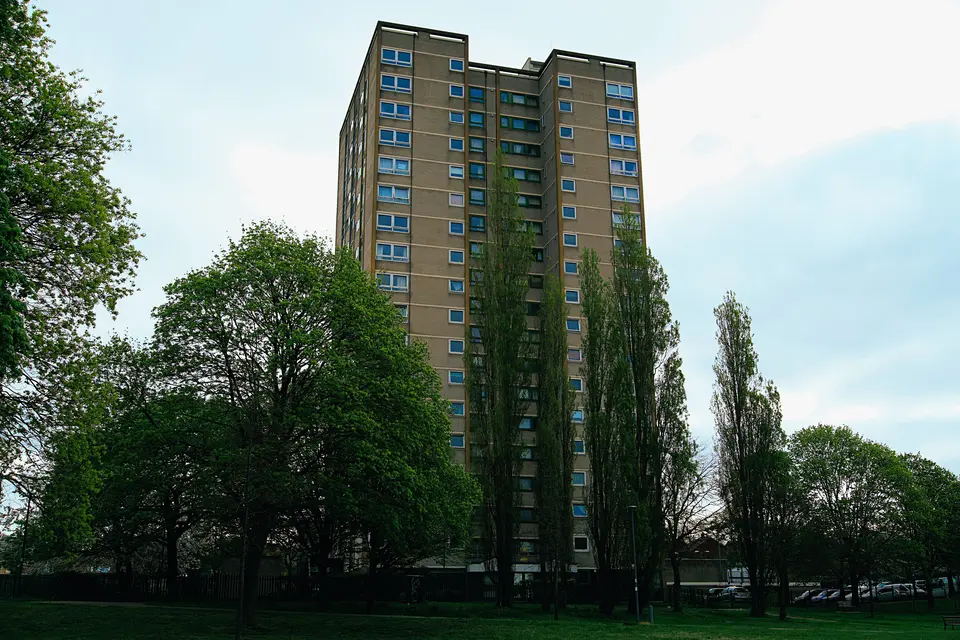If you rent out a property to multiple tenants who aren’t part of the same household, the property you’re renting out could be classed as a house in multiple occupation or a HMO. If you’re considering converting your buy-to-let into one, then you need specific house in multiple occupation insurance. But fear not! In this blog we answer: what is HMO insurance, what does it cover and what responsibilities you will have as a HMO landlord. You could be new to renting one out or you may have been managing one for years, but having the right cover isn’t just a formality; it could be the difference between peace of mind and facing a potential financial disaster. Let’s get into it!
What Does HMO Stand For?
So, what does HMO stand for? Well it’s short for house in multiple occupation and it’s a legal classification used to describe a rental property where three or more tenants who aren’t a part of the same household don’t just share the same property, but amenities like the bathroom and kitchen. This could be a group of students sharing a house or even a block of flats that has shared communal areas. If at least one of the tenants pays the rent, then the property may be classed as one depending on the number of occupants and how the home is laid out.
What Is A HMO Property?
When people ask ‘what is a HMO property?’, they’re usually referring to the legal definition, but it’s not always straightforward. Just because your tenants share a kitchen doesn’t automatically mean you’re a HMO landlord.
Your property is classed as a HMO if:
- It’s rented to three people or more that are from more than one household.
- The tenants share a toilet, bathroom and/or kitchen.
- At least one tenant pays the rent (or their rent is paid on their behalf)
HMOs can be anything from shared houses to bedsits to student accommodations. If you have three or more people who are unrelated living in one house while sharing a bathroom, kitchen and communal spaces then your property probably is one. This also comes with its own specific legal requirements, for example, you’ll also need specific house in multiple occupation insurance.

What Is HMO Insurance?
House in multiple occupation insurance is a specific type of landlord insurance that’s designed to cover the risks associated with renting out these types of properties. A standard landlord insurance policy often won’t be suitable for you and if you don’t tell your insurer that your property falls under HMO regulations, you could find your policy invalid should you ever go to try and make a claim.
What’s Covered Under House In Multiple Occupation Insurance?
Running a house in multiple occupation isn’t the same as renting out a typical buy-to-let property with a single household, and neither is your insurance policy. This is because these properties have specific liabilities and risks associated with them, so you need specific cover. Landlord insurance for HMOs isn’t a one size fits all policy, and your insurance will vary depending on how many tenants there are, the layout of your property and the level of risks you’re exposed to. Here are some of the covers that may be included in your policy:
Building sums insurance
If a fire, flood, or structural collapse damages your HMO property, building sums insurance covers the full cost of repair or rebuild. In a house in multiple occupation, where you’ve likely made alterations to accommodate multiple tenants (such as extra kitchens, fire doors, or partition walls) rebuilding costs can be much higher than in a typical buy-to-let. This cover ensures you’re not out of pocket if the worst happens. If your property is in a licensed area, councils may also require the rebuild value to be adequately insured as part of the licensing conditions.
Loss of rent
One of the key reasons landlords invest in a HMO property is for the higher rental yield. But if an incident like a kitchen fire, burst pipe or electrical fault makes the property uninhabitable, you lose that income stream. Loss of rent cover protects your cash flow while your tenants can’t live in the property. Having cover in place ensures you’re not left financially stranded whilst work is carried out.
Alternative accommodation
HMOs often house vulnerable tenants who often don’t have easy access to backup housing. If something happens that results in the property being no longer inhabitable, for example a fire breaks out causing severe damage, it’s your responsibility to arrange alternative accommodation. This cover will fund the cost of temporary accommodation which would otherwise have to come out of your own pocket, and be financially devastating.
Property owners’ liability
Accidents can happen to anyone. Houses in multiple occupations are more prone to this since there are many people coming in and out of your property on a daily basis. Whether it’s a tenant or a member of the public, if someone becomes injured in or around your property, as the landlord you could be held liable. Property owner’s liability will cover the cost of any claims made against you in this instance.
Contents insurance
Having contents cover included in your house in multiple occupation insurance, will cover your belongings. As a landlord you may provide furniture for communal spaces or appliances for the shared kitchen, these can be expensive if you have to replace them. Since there’s a lot of footfall in these types of properties this increases the risk of these items being damaged or even stolen. But contents insurance will cover the cost of replacing these items.
Property damage
Property damage cover is there to protect you against the cost of repairs following incidents like vandalism, fire, flooding, or accidental damage. HMOs tend to experience more wear and tear than standard rentals, but they’re also more prone to serious damage; whether it’s a tenant punching a hole in a door during a dispute or a leaking shower causing water damage to multiple floors. If you don’t have property damage included in your insurance, the costs of putting things right could fall entirely on you. Some policies may restrict cover for malicious damage caused by tenants, depending on the wording, which is why working with an insurance broker helps ensure you’re not left exposed when you need support the most.
HMO Housing Risks You Need To Be Aware Of
Letting out a house in multiple occupation can generate strong rental income, but landlords face increased responsibilities due to the number of tenants and the way the property is used. The risks below are specific to HMO properties and can have serious financial implications if not managed correctly.
Higher fire risk
Multiple tenants cooking at different times, using separate appliances, and overloading plug sockets increases the likelihood of a fire. A tenant leaving a chip pan unattended or running electrical heaters in their room overnight are common triggers.
Damage to communal areas
Shared kitchens and bathrooms often suffer from cracked tiles, broken cupboard doors, and damaged flooring. In HMOs with short-term tenancies, landlords regularly report damage to carpets and doors in stairwells.
Legal disputes
HMO landlords sometimes face claims from tenants over delayed repairs or disputes over who’s responsible for damage in shared spaces. One tenant may refuse to pay rent if another is accused of causing the issue, leaving landlords caught in the middle.
Increased wear and tear
Showers used by six people instead of two will wear out faster, and cookers shared by unconnected tenants see more misuse. The property requires more frequent redecoration and replacement of fixtures compared to single-tenant lets.
Vandalism or theft
Front doors without working locks, or communal areas with unsecured windows, can lead to break-ins. In some cases, departing tenants have removed furniture or damaged appliances before moving out.
Landlord liability for accidents
If a tenant falls down a poorly lit staircase or burns themselves due to faulty wiring in the kitchen, the landlord could be held responsible. Councils expect a higher standard of maintenance in licensed HMOs, and failure to comply could result in legal action.
How To Get HMO licensing
You may need to apply for a HMO licence with your local council. However if your property is rented out to five or more people, then it will be classed as a large HMO and the licence will be mandatory. lt’s a criminal offence in the UK if you are operating a HMO without a licence this could lead to fines, rent repayment orders and even the council taking over management of the property. If you have been caught, councils can even ban you from renting out properties. If you’re unsure whether your property needs a licence, speak to your local council or a housing solicitor.

Get House In Multiple Occupation Insurance Insurance Today With EYIB
At East Yorkshire Insurance Brokers, we work with landlords who let out HMO properties. Whether you own a small three-bedroom student let or a multi-storey conversion with long-term tenants, we can arrange house in multiple occupation insurance that fits your needs and reflects the true risks you face. Our MD John has over 15 years of experience in commercial and landlord insurance; with access to over 300 insurers we can compare policies and find the one that suits you best.
If you’re unsure whether your rental property qualifies as a HMO, or you’re worried your existing landlord insurance won’t cover you properly, we can help. We understand the nuances of HMO housing and what cover landlords really need. Get in touch for an insurance review today and make sure your house in multiple occupation is properly protected.
House In Multiple Occupation Insurance FAQs
What is a HMO in the UK?
A HMO (House in Multiple Occupation) is a property rented to three or more people from different households who share facilities like kitchens or bathrooms.
Do I need special insurance for a HMO?
Yes. Standard landlord insurance usually doesn’t cover the additional risks associated with HMO housing. You’ll need a specialist HMO insurance policy.
How much does HMO insurance cost?
Insurers consider HMOs to be higher risk due to the number of occupants and use of communal areas. However, pricing depends on the size and location of your property, the type of tenants you let to, and your claims history. Getting in touch with an insurance broker will give you an idea of how much it will be.
Do I need HMO insurance if I only rent to students?
Yes. Student lets still fall under the definition of a house in multiple occupation if three or more tenants from different households share amenities. You’ll need appropriate cover.
What happens if I don’t tell my insurer my property is an HMO?
If your insurer finds out that your property was being operated as an HMO and you hadn’t disclosed it, they may refuse to pay out on claims or void your policy altogether.


